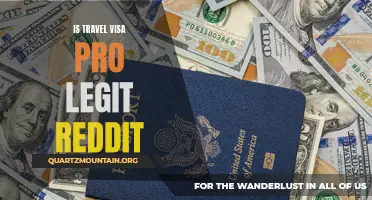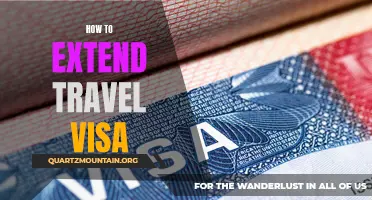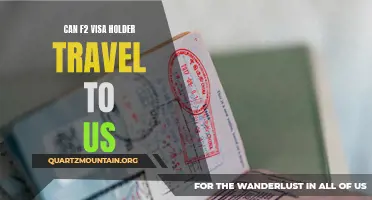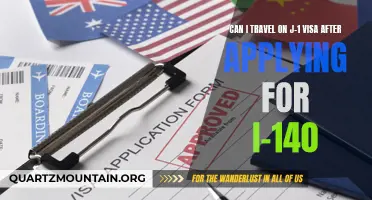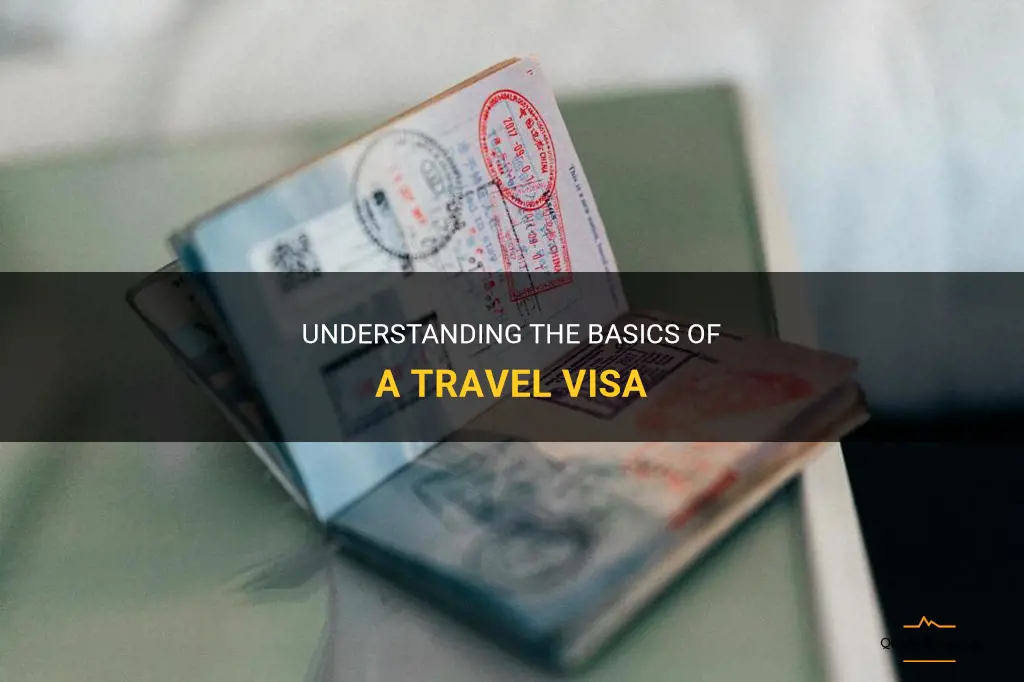
Travelling to a new country can be an exciting adventure, but before you pack your bags and hop on a plane, it's important to understand the basics of a travel visa. Whether you're planning a short vacation or an extended stay, this essential document is a crucial component of international travel. From understanding the different types of visas to knowing the application process and requirements, this guide will provide you with all the information you need to navigate the world of travel visas with confidence. So, grab your passport and let's dive in!
What You'll Learn
- What is a travel visa and why is it necessary for international travel?
- How does one obtain a travel visa for a specific country?
- Are there different types of travel visas depending on the purpose of travel (e.g. tourism, work, study)?
- How long does it typically take to process a travel visa application?
- Are there any special requirements or documents needed to apply for a travel visa?

What is a travel visa and why is it necessary for international travel?
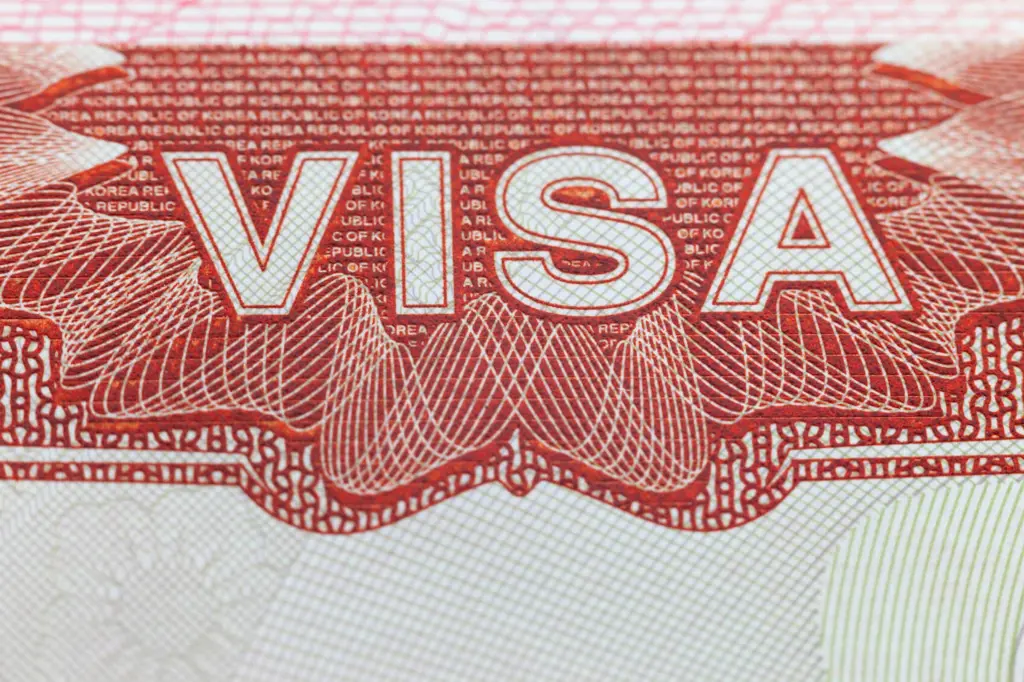
A travel visa is an official document or stamp issued by a country's government that allows individuals to enter and stay in that country for a specified period of time. It is necessary for international travel because it serves as a form of permission from the host country for the traveler to enter and stay.
The main purpose of a travel visa is to ensure that individuals entering a country have a legitimate reason for doing so and that they will abide by the country's laws and regulations during their stay. It also helps the host country keep track of who is entering and leaving the country for security and immigration purposes.
Obtaining a travel visa can be a complex and time-consuming process, as it typically involves filling out an application form, providing documentation such as a passport, itinerary, and proof of financial means, and sometimes attending an interview at a consulate or embassy. The specific requirements vary depending on the country being visited and the purpose of the trip, such as tourism, business, or study.
For example, if someone wants to visit Thailand for tourism purposes, they would need to apply for a tourist visa. The application process would involve submitting a completed application form, a valid passport with at least six months of remaining validity, two passport-sized photos, proof of accommodation, and proof of sufficient funds to cover the stay in Thailand. Once the application is processed and approved, the individual would receive a travel visa allowing them to enter Thailand for a specified period of time.
It is important to note that not all countries require a travel visa for entry. Some countries have visa exemption agreements with certain countries, allowing travelers to enter for a specified period of time without a visa. For example, citizens of the United States can enter many European countries for up to 90 days without a visa.
In summary, a travel visa is a necessary document for international travel as it serves as a form of permission from the host country for the traveler to enter and stay. It helps ensure that individuals have a legitimate reason for visiting and that they will abide by the host country's laws and regulations. Obtaining a travel visa can be a complex process, but it is essential for a smooth and legal entry into a foreign country.
Can You Travel on OPT with an Expired Visa? Exploring the Options and Regulations
You may want to see also

How does one obtain a travel visa for a specific country?
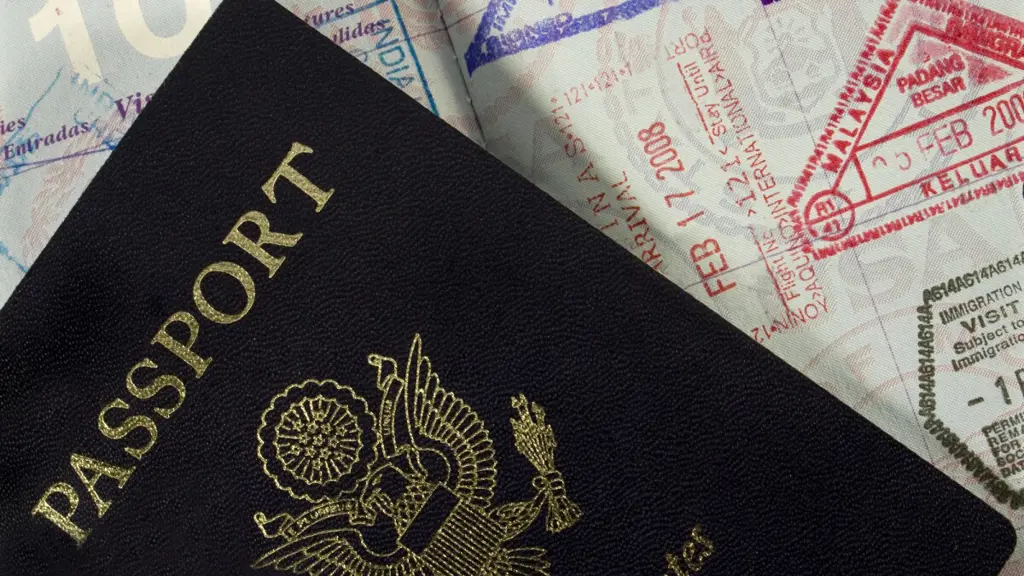
Traveling to a different country can be an exciting and enriching experience. However, before embarking on your journey, it is crucial to understand and fulfill the visa requirements of the country you plan to visit. A visa is an official document that allows you entry into a foreign country for a specific purpose and duration. In this article, we will explore the process of obtaining a travel visa for a specific country, step by step.
- Research the visa requirements: The first step in obtaining a travel visa for a specific country is to research the visa requirements for that country. Every country has its own set of visa policies and criteria, so it is essential to understand what documents and information you need to provide. You can visit the official website of the embassy or consulate of the country for detailed information on visa requirements.
- Determine the type of visa: Once you have familiarized yourself with the visa requirements, you need to identify the type of visa that is applicable to your purpose of travel. Common types of visas include tourist, business, student, work, and transit visas. Each visa type has its own set of documents and eligibility criteria, so make sure you choose the correct category.
- Prepare the required documents: After determining the type of visa, gather all the necessary documents as per the requirements stated by the embassy or consulate. Common documents include a valid passport, passport-sized photographs, completed visa application form, proof of travel itinerary, proof of accommodation, proof of sufficient funds, and any other specific documents required for the particular visa type.
- Complete the visa application form: Fill out the visa application form accurately and honestly. Provide all the requested information and ensure that it matches the details on your supporting documents. Any discrepancies or incomplete information may result in delays or even rejection of your visa application.
- Schedule an appointment: Many countries require applicants to schedule an appointment at the embassy or consulate to submit their visa application and supporting documents. Check the official website of the embassy or consulate for appointment scheduling procedures and availability. It is advisable to schedule your appointment well in advance to avoid last-minute complications.
- Submit your application: On the day of your appointment, visit the embassy or consulate and submit your visa application and supporting documents. Be prepared for the possibility of an interview or additional questions from the consular officer. Provide concise and honest answers during the interview, as the officer will assess your eligibility for the visa based on your responses.
- Pay the visa fee: Most countries charge a fee for visa processing. Make sure you are aware of the fee amount and payment methods accepted by the embassy or consulate. Pay the fee as instructed and retain the payment receipt for future reference.
- Wait for visa processing: After submitting your application, the embassy or consulate will review and process your visa. The processing time may vary depending on the country and visa type. It is advisable to plan your travel well in advance, considering the processing time.
- Obtain your visa: If your visa application is approved, you will receive your visa stamped in your passport. Make sure to check all the details on the visa, including the validity dates and visa conditions. If your visa application is rejected, the embassy or consulate will provide a reason for the rejection, and you may have the option to reapply or appeal the decision.
- Prepare for your trip: Once you have obtained your visa, you can proceed with your travel preparations. Make copies of your passport and visa, as well as any other important documents, and keep them separately from the originals. Familiarize yourself with the customs and regulations of the country you are visiting to ensure a smooth and enjoyable trip.
In conclusion, obtaining a travel visa for a specific country requires careful research, preparation, and adherence to the visa requirements and procedures. By following the step-by-step process outlined in this article, you can increase your chances of securing a visa and embark on your journey with peace of mind. Remember to start the visa application process well in advance to allow for sufficient processing time. Safe travels!
Exploring the Opportunities of Traveling to Canada on an H1B Visa
You may want to see also

Are there different types of travel visas depending on the purpose of travel (e.g. tourism, work, study)?
_20240314174208.webp)
There are indeed different types of travel visas depending on the purpose of travel. The reason for this is that different activities and lengths of stay in a foreign country may require different types of documentation and permissions. Whether someone is traveling for tourism, work, or study, it is important to understand the specific visa requirements and process.
Tourism visas are the most common type of travel visa. These visas are granted to individuals who plan to visit another country for leisure or recreational purposes, such as sightseeing, visiting friends or family, or participating in tourist activities. The requirements for a tourism visa vary depending on the destination country, but generally include a valid passport, proof of sufficient funds to cover the expenses of the trip, and a confirmed return ticket.
Work visas are necessary for individuals who plan to work in a foreign country. These visas are often more complex to obtain, as they require proof of employment or sponsorship from a company in the destination country. The requirements for a work visa include a job offer letter, proof of qualifications or work experience, and sometimes a labor market test to demonstrate that no qualified locals are available for the job. Work visas may be valid for a fixed period of time or for the duration of the employment contract.
Study visas, also known as student visas, are required for individuals who plan to pursue their education in a foreign country. These visas are granted to students who have been accepted into an educational institution and plan to attend full-time courses. The requirements for a study visa include an acceptance letter from a recognized educational institution, proof of financial ability to cover tuition fees and living expenses, and sometimes a medical examination. Study visas are generally valid for the duration of the academic program.
In addition to these common types of travel visas, there are also specialized visas for specific purposes such as medical treatment, investment, or diplomatic missions. These visas may have additional requirements and may require specific documentation depending on the purpose of the visit.
It is important to note that the visa application process can vary greatly depending on the destination country. It is recommended to consult the official website of the embassy or consulate of the destination country to obtain accurate and up-to-date information on visa requirements. It is also advisable to start the visa application process well in advance, as it may take time to gather all the necessary documentation and to schedule any required appointments or interviews.
In conclusion, there are different types of travel visas depending on the purpose of travel. Whether one is traveling for tourism, work, or study, it is essential to understand the specific visa requirements and process. Each type of visa has its own set of requirements, and it is important to carefully follow the instructions and provide all the necessary documentation. By being well-informed and prepared, individuals can ensure a smooth and successful visa application process.
Where Can I Travel with an F1 Visa? A Guide for International Students
You may want to see also

How long does it typically take to process a travel visa application?
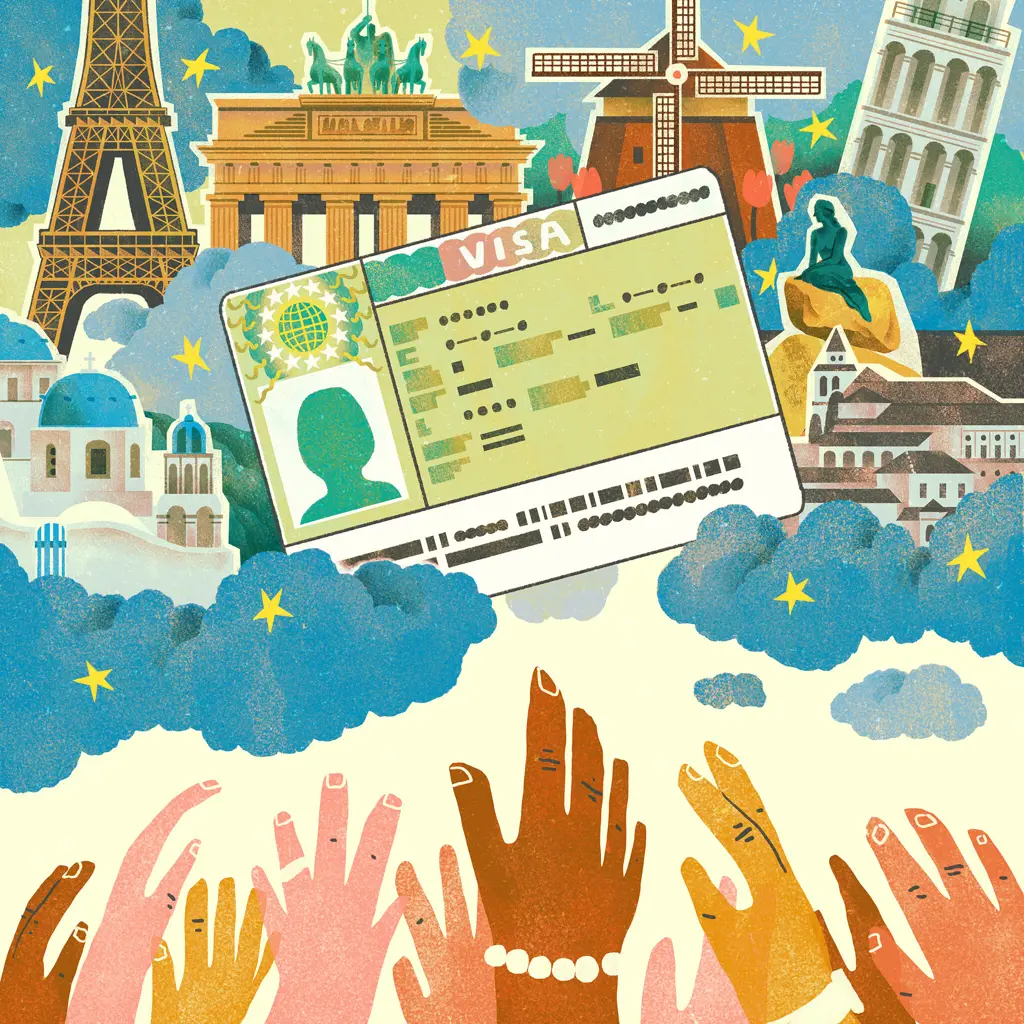
Traveling to a foreign country often requires obtaining a travel visa. A travel visa is an official document that grants temporary entry into a country for specific purposes such as tourism, business, or study. One common question people have is how long it typically takes to process a travel visa application. The answer, however, varies depending on several factors and can range from a few days to several months.
The processing time for a travel visa application can be influenced by the country you are applying to, the type of visa you are seeking, and the volume of applications being processed at the time. Some countries have a more streamlined and efficient visa application process, while others may have a longer and more complex procedure.
In general, it is advisable to start the visa application process well in advance of your planned travel dates. It is recommended to check the embassy or consulate website of the country you are planning to visit to get accurate information on visa processing times. These websites often provide information on the estimated timeframes for different types of visas.
To give you an idea of the typical visa processing times, let's take a look at a few examples:
- Schengen Visa: The Schengen area is a group of 26 European countries that have abolished passport control at their mutual borders. The processing time for a Schengen visa application is typically around 15 calendar days. However, this may vary depending on the country and the consulate or embassy where you apply.
- United States Visa: The processing time for a U.S. visa can vary greatly depending on the type of visa you are applying for. Nonimmigrant visas, such as tourist or business visas, generally have a processing time of a few weeks to a couple of months. Immigrant visas, which are for individuals planning to live permanently in the U.S., can take several months to process due to additional document requirements and security checks.
- Australian Visa: The processing time for an Australian visa can range from a few days to several months. The timeframe depends on the type of visa and the country from which you are applying. For example, tourist visas are usually processed within a few days, while work visas may take several weeks or even months.
It is important to note that these processing times are just general estimates and can change based on individual circumstances. Delays can occur due to factors such as incomplete documentation, background checks, or unforeseen events. It is always advisable to apply for a travel visa well in advance of your intended departure date to allow for any unforeseen delays.
To ensure a smooth visa application process, it is essential to provide all the required documents accurately and within the specified timeframe. Be sure to double-check the visa application requirements and follow the instructions carefully. Any mistakes or missing documents can result in delays or even denial of the visa.
In conclusion, the processing time for a travel visa application can vary depending on various factors. It is best to start the visa application process well in advance and check the embassy or consulate website of the country you are planning to visit for accurate information on processing times. By following the guidelines and providing all the necessary documents, you can increase your chances of a successful and timely visa application.
Traveling from the US to Canada: Can I Enter with a US Visa?
You may want to see also

Are there any special requirements or documents needed to apply for a travel visa?
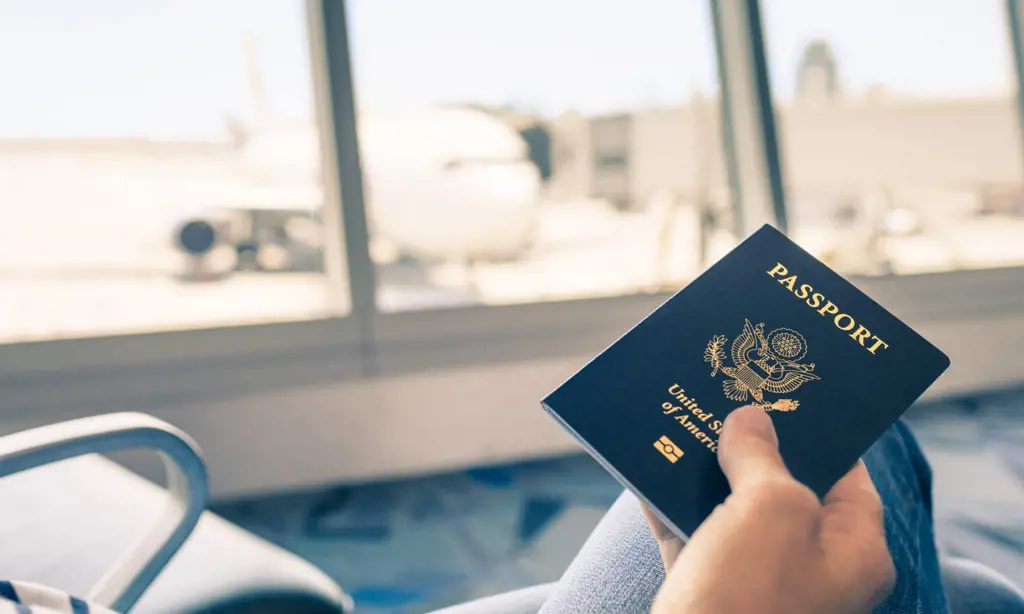
When planning to travel to a foreign country, one of the important things to consider is the visa requirements. A travel visa is a document that allows a person to enter and stay in a foreign country for a specific period of time. The requirements for obtaining a travel visa vary depending on the country you are visiting and the purpose of your visit.
Here are some of the general requirements and documents that may be needed to apply for a travel visa:
- Passport: A valid passport is a basic requirement for obtaining a travel visa. Your passport should be valid for at least six months from the date of your intended departure. Some countries may also require additional blank pages in your passport.
- Visa application form: Most countries require you to fill out a visa application form. This form may be available online or at the embassy or consulate of the country you are visiting. Fill out the form accurately and completely, providing all the necessary information.
- Photographs: You will usually need to provide passport-sized photographs along with your visa application. These photographs should meet the requirements specified by the country you are visiting, such as size, background color, and quality.
- Proof of travel arrangements: Many countries require you to provide proof of your travel arrangements, such as flight tickets or a travel itinerary. This is to ensure that you have a valid reason for visiting the country and that you have a plan for departure.
- Proof of accommodation: Some countries may also require proof of accommodation, such as hotel reservations or an invitation letter from a host. This requirement is to ensure that you have a place to stay during your visit and that you have enough funds to support yourself.
- Financial documents: Some countries may ask for financial documents to verify that you have sufficient funds to support your stay. These documents may include bank statements, tax returns, or proof of employment. The specific requirements may vary depending on the country you are visiting and the length of your stay.
- Travel insurance: It is always a good idea to have travel insurance when traveling abroad. Some countries may require proof of travel insurance as part of the visa application process. This is to ensure that you will be covered in case of any unexpected medical or travel emergencies.
- Supporting documents: Depending on the purpose of your visit, you may also need to provide additional supporting documents. For example, if you are visiting a country for business purposes, you may need to provide a letter from your employer or a business invitation. If you are visiting for educational purposes, you may need to provide an acceptance letter from the educational institution.
It is important to note that the requirements for obtaining a travel visa can vary greatly depending on the country you are visiting. It is recommended to check the specific visa requirements of the country you plan to visit well in advance of your travel dates. Contact the embassy or consulate of that country for the most up-to-date and accurate information.
In conclusion, applying for a travel visa may require several documents and fulfilling certain requirements. It is important to gather all the necessary documents and carefully follow the application process. By doing so, you can ensure a smooth and successful visa application process.
Understanding the Importance of the Travel Document Number on a Visa
You may want to see also
Frequently asked questions
A travel visa is an official document issued by a country's government that allows individuals to enter and stay in that country for a specified period of time. It grants permission to travel to a specific destination and may also come with certain restrictions or conditions.
The need for a travel visa varies depending on your nationality and the destination country's immigration rules. In many cases, a travel visa is required to regulate the entry and stay of foreign visitors. It helps the government keep track of who is entering the country and for what purposes. It also gives them the opportunity to conduct security checks and ensure the individual has a valid reason for their visit.
The process of obtaining a travel visa typically involves submitting an application to the embassy or consulate of the destination country. The application may require various documents, such as a passport, proof of travel arrangements, proof of accommodation, financial statements, and a visa fee. The processing time and requirements can vary greatly depending on the country, so it's important to check the specific visa requirements and guidelines of the destination country before starting the application process.


